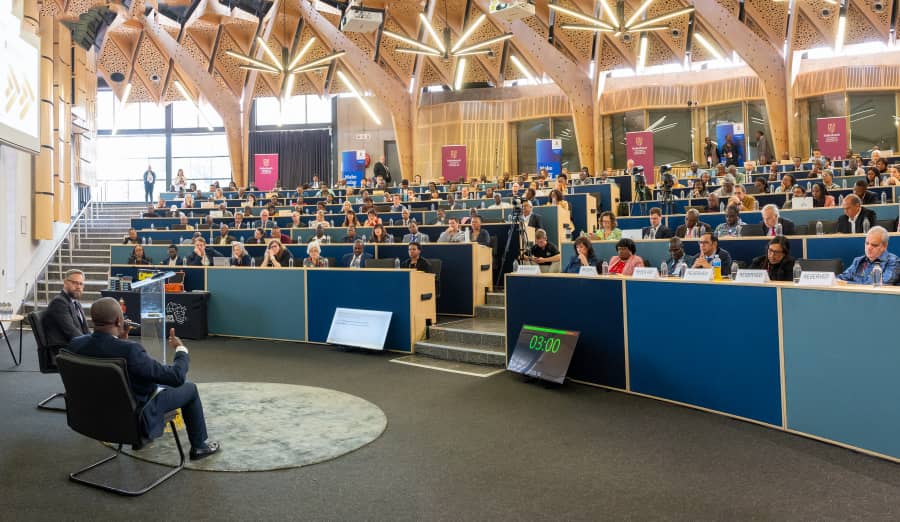SGCI News
A research and innovation management program helps scientific research granting agencies to select and fund the most effective projects. By Afeez Bolaji A new project tackles the research and innovation…
- Research management project to promote research, innovation and development in Africa
- It will help scientific research funding agencies to identify and manage effective research.
- The aim of this project is to stimulate economic and social development in sub-Saharan Africa.
A research and innovation management program helps scientific research granting agencies to select and fund the most effective projects.
A new project tackles the research and innovation challenges facing sub-Saharan Africa, bridging funding gaps and gender imbalances to boost development in the region.
The Research and Innovation Management (RIM) project was driven by the Scientific Research Granting Agencies Initiative (SRGI) to help the 17 member councils identify, fund and manage effective research and innovation projects in the countries where they operate.
IOSRS is a regional initiative created to promote science and innovation.
The RIM project brings together research and innovation players to stimulate development at national and regional levels, says Cephas Adjei Mensah, Director of Research, Statistics and Information Management at Ghana’s Ministry of Environment, Science, Technology and Innovation.
“The RIM project has been a real blessing,” he said.
“We have been able to design our own research, innovation and management framework by identifying the projects we fund in line with national priorities.”
“We have launched our first two calls for research projects [au Ghana], in September and October 2023. We received over 100 applications, including collaborative projects,” he declared.
Cephas Mensah acknowledged the lack of immediately available funds, explaining that solution-based proposals would be considered as funds became available.
He added that Ghana’s Scientific Research Granting Council was working to increase public funding for research and innovation.
“We also want to improve collaboration and communication on our actions to get partners on board who are willing to join our initiative,” he added.

The RIM project is being implemented by a consortium comprising the African Centre for Technical Studies, the Association of African Universities and the Université Cheikh Anta Diop de Dakar.
Frederick Ato Armah, Director of Research and Programs at the Association of African Universities, reported that the councils had funded 81 projects through the RIM project, including 25 public-private partnerships.
He added that at least six councils had launched calls for research projects aimed exclusively at women.
“For example, the councils of Ghana and Zambia have launched bilateral calls for tender aimed at increasing the number of women-led projects in agro-processing and food processing.”
He believes that all the projects selected have the potential to transform countries that have set up such councils.
“Ultimately, the projects selected by the 17 councils can, potentially, generate social change, foster economic growth and improve the well-being of the populations concerned by the grants,” he said.
The RIM project should improve the organizations’ ability to fund research projects and foster economic and social development in their respective countries, he added.
He said the councils were developing action plans, including effective monitoring, evaluation and learning systems, to measure the progress made by the RIM project and funded projects, so that managers are accountable for results and make informed decisions.
“As a result, each country’s Science, Technology and Innovation (STI) systems will become more effective and play a vital role in promoting inclusive development in sub-Saharan Africa,” added Frederick Ato Armah. IOSRS is a multilateral initiative set up to strengthen the institutional skills of public scientific funding agencies in sub-Saharan Africa, and to provide financial support for research and strategies based on reliable data that will contribute to economic and social development.
Related News
Voices of SGCI: Council leaders on the direction and ambition of SGCI 3
At the African Union’s Science, Technology and Innovation Week in Addis Ababa, earlier this month, leaders of science granting councils reflected on what SGCI Phase 3 represents for Africa’s science and innovation systems. From ownership and alignment to stewardship and sustainability, here are their voices…
Building Africa’s science future: inside the SGCI alliance
As Phase 3 of the Science Granting Councils Initiative launches on the margins of the African Union Summit in Addis Ababa last week, the SGCI Alliance Chair explains why this moment marks a decisive turning point for African science. Cephas Adjei Mensah describes what is…
Open call: Support for science granting councils in Sub-Saharan Africa
The International Development Research Centre (IDRC), through the Science Granting Councils Initiative (SGCI), has launched a call for proposals to support science granting councils in Sub-Saharan Africa in the establishment and operationalisation of the Capacity Strengthening Hub under Phase III of the SGCI-3. The Hub…
SGCI funded projects
Rwanda’s integrated approach to sustainable agriculture and nutrition
Project Titles & Institution Areas of Research Number of Projects being funded Project Duration Grant Amount In-Kind Distribution Council Collaboration with other councils





